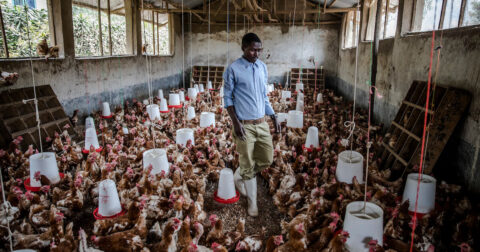Investigation
Meat Processing Plant Complaint Highlights Supply Chain Disruptions — And How the Meat Industry Isn’t Prepared
Food•4 min read
Reported
The rapid increase of antibiotic resistance is threatening the future of poultry farming in Zimbabwe. Experts say education is the root of the problem.


Words by Andrew Mambondiyani
Paidamoyo Bande, a small-scale poultry farmer in Mutare district in eastern Zimbabwe is extremely anxious.
Bande had every reason to be worried as some of his chickens were no longer responding positively to traditional medicines. Bande is one of the many people across Zimbabwe who in recent years turned to small-scale poultry farming to augment low incomes from formal jobs.
Many unemployed people in the country, particularly women, have also ventured into poultry farming as a source of income. At the same time, frequent and severe droughts are forcing many small-scale farmers to abandon crop farming for poultry farming. Rain-fed crop farming in Zimbabwe is becoming unsustainable due to climate change droughts. Outside many houses across the country—both in urban and rural areas—broilers and layers could be seen crammed in small and unhygienic fowl-runs.
Every week, small-scale poultry farmers in the eastern parts of Zimbabwe crowd to buy day-old chicks—mostly broilers—at a small veterinary outlet in the city of Mutare. And according to the Zimbabwe government’s second crop and livestock assessment report for 2021, small-scale broiler production, though affected by the COVID-19 pandemic, accounts for 73 percent of the total broiler meat produced in the country.
But behind the growth of small-scale poultry farming in Zimbabwe is a story of the misuse and overuse of antimicrobials in chicken farming. This has resulted in the rapid increase of antimicrobial resistance (AMR) that is threatening the future of poultry farming in Zimbabwe.
Recent research revealed that colibacillosis—a disease caused by avian pathogenic escherichia coli (APEC)—could result in serious losses in the poultry sector in Zimbabwe as high levels of multidrug resistance could hamper the treatment of the disease. However, with little to no knowledge of the proper use of antimicrobials, many small-scale poultry farmers continue to misuse medicines meant to treat poultry diseases.
“Our findings show that there is emerging drug resistance in APEC associated with colibacillosis in Zimbabwe. The observed high level of multidrug resistance could hamper the treatment of colibacillosis in Zimbabwe,” reads part of the research.
The World Health Organization (WHO) weighed in, adding that the misuse and overuse of antimicrobials is a major cause of drug-resistant pathogens. However, many farmers in Zimbabwe have not fully understood how antimicrobial resistance affects their poultry. And like Bande, many poultry farmers are now observing resistance to more than one antibiotic they are using.
“I didn’t know about the terminology of the phenomenon but I’m experiencing it. Yes, I have noticed that [resistance to antibiotics] a couple of times,” Bande said.
He said his poultry—broilers and layers—were dying even after using the recommended medicines. In some cases, he said, the recovery rate for sick birds after administering the right medicines and doses was abnormally low.
“To be honest there is really nothing I can do apart from counting the losses; losses in mortality rate as well as medicines that fail to work as expected,” Bande said.
Paul Mutasa, another small-scale poultry in Mutare, said his wife does most of the vaccinations for their chickens.
“My wife is not a qualified veterinary expert but she vaccinates our chickens,” said Mutasa. “I didn’t know much about the implications of overusing the medicines but I think my wife is doing the job properly. We have never experienced any serious losses since we started the project a few years ago.”
But Canaan Tinashe Hodobo, the coordinator of AMR surveillance at the Central Veterinary Laboratory in Zimbabwe, made it clear that farmers were advised on the correct directions of use of the medicine and that they must be strictly followed.
In an effort to address the burden of AMR, Zimbabwe is developing a multi-sectoral AMR monitoring plan. The results from the data collected will inform policy changes moving forward. Officials hope to complete this process by the end of the year.
However, Lalitha Mtetwa, a livestock expert and founder of The Livestock Specialist Zimbabwe, said from her recent findings suggest that the prevalence of AMR in some regions was still very minimal, according to the chicken samples she examined from Zimbabwe’s Mashonaland Central province. The organization’s stated mission is to help farmers by increasing the efficiency and viability of sustainable livestock production.
“Lack of knowledge on [the] use of the antimicrobials and the fact that they are easily accessible to anyone without a prescription could be disastrous in the coming future,” said Mtetwa. And despite Mashonaland Central’s relatively low instance of AMR, she “noted quite a number of meat samples which tested positive for antibiotics.”
To get ahead of AMR, Mtetwa said the government must set stricter measures on the purchase of the antimicrobials, and monitoring by relevant authorities must increase, from the farm right up to the point of sale. She also believes education on the risks of AMR needs to be intensified, especially throughout the poultry value chain.